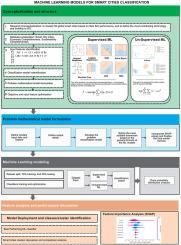Global smart cities classification using a machine learning approach to evaluating livability, technology, and sustainability performance across key urban indices
IF 10
1区 环境科学与生态学
Q1 ENGINEERING, ENVIRONMENTAL
引用次数: 0
Abstract
Smart cities have become an increasingly important response to urbanization challenges, integrating technology to enhance city infrastructure, services, and sustainability. This study aims to classify the highest 50 global smart cities based on key livability and technology indices, using advanced machine learning (ML) models to assess city performance comprehensively. The necessity of this research lies in its focus on identifying patterns and best practices among high-performing cities, offering actionable insights for urban planners and policymakers aiming to improve smart city initiatives. This approach is necessary for understanding and replicating best practices in urban management and smart city development. Focusing on high-ranking cities ensures the study analyzes robust and reliable data, avoiding noise and inconsistencies arising from lower-performing or less-documented cases. Drawing on data from the Smart Cities Index (SCI) and other economic and sustainability competitiveness metrics, the study uses various ML algorithms to categorize cities into performance classes, ranging from high-achieving Class 1 to emerging Class 3 cities. The methodology involves data preparation with imputation and normalization, followed by training 9 supervised ML models. The results show that Support Vector Machine (SVM), K-Nearest Neighbors (KNN), and Decision Tree are identified as the most effective classifiers. Furthermore, the results indicate that cities with well-integrated governance, infrastructure, and sustainability practices consistently rank higher, while cities in the lower classes face challenges in these areas. Policy implications suggest that cities aiming to enhance their smart city performance should prioritize comprehensive urban management strategies that balance technological infrastructure with sustainability and public service accessibility to drive more equitable and resilient urban growth.


使用机器学习方法评估主要城市指数的宜居性、技术和可持续性表现的全球智慧城市分类
智慧城市已成为应对城市化挑战的日益重要的手段,通过整合技术来增强城市基础设施、服务和可持续性。这项研究旨在根据关键的宜居性和技术指标对全球排名前50位的智慧城市进行分类,并使用先进的机器学习(ML)模型对城市表现进行全面评估。这项研究的必要性在于其重点在于确定高绩效城市的模式和最佳实践,为旨在改善智慧城市倡议的城市规划者和政策制定者提供可操作的见解。这种方法对于理解和复制城市管理和智慧城市发展的最佳实践是必要的。专注于排名靠前的城市,可以确保研究分析稳健可靠的数据,避免因表现较差或记录较少的案例而产生的噪音和不一致。根据智能城市指数(SCI)和其他经济和可持续发展竞争力指标的数据,该研究使用各种ML算法将城市划分为绩效等级,从高成就的1级城市到新兴的3级城市。该方法包括数据准备和归一化,然后训练9个有监督的ML模型。结果表明,支持向量机(SVM)、k近邻(KNN)和决策树是最有效的分类器。此外,研究结果表明,治理、基础设施和可持续发展实践整合良好的城市排名始终较高,而排名较低的城市在这些领域面临挑战。政策影响表明,旨在提高智慧城市绩效的城市应优先考虑综合城市管理战略,在技术基础设施与可持续性和公共服务可及性之间取得平衡,以推动更加公平和有弹性的城市增长。
本文章由计算机程序翻译,如有差异,请以英文原文为准。
求助全文
约1分钟内获得全文
求助全文
来源期刊

Journal of Cleaner Production
环境科学-工程:环境
CiteScore
20.40
自引率
9.00%
发文量
4720
审稿时长
111 days
期刊介绍:
The Journal of Cleaner Production is an international, transdisciplinary journal that addresses and discusses theoretical and practical Cleaner Production, Environmental, and Sustainability issues. It aims to help societies become more sustainable by focusing on the concept of 'Cleaner Production', which aims at preventing waste production and increasing efficiencies in energy, water, resources, and human capital use. The journal serves as a platform for corporations, governments, education institutions, regions, and societies to engage in discussions and research related to Cleaner Production, environmental, and sustainability practices.
 求助内容:
求助内容: 应助结果提醒方式:
应助结果提醒方式:


